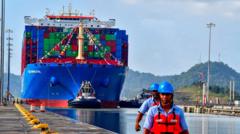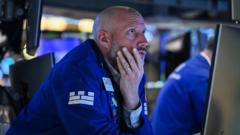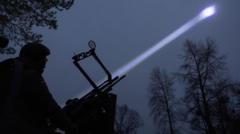Former President Donald Trump's assertion that China operates the Panama Canal has prompted denials from both Panamanian and Chinese officials. While China is a significant user of the canal, it does not control its operations, which remain under the purview of the Panama Canal Authority.
Trump's Claims on Panama Canal Operation Spark Controversy

Trump's Claims on Panama Canal Operation Spark Controversy
Amidst recent remarks by former President Trump, questions surrounding China's role in the Panama Canal have resurfaced.
During his inaugural address, former President Donald Trump reiterated his controversial claim that China operates the Panama Canal, provoking reactions from officials in Panama and China. Trump stated, "China is operating the Panama Canal and we didn't give it to China," emphasizing his belief that the canal was meant for Panama, from which the U.S. aims to reclaim control. Located in Central America, the Panama Canal is crucial for maritime trade, accommodating approximately 14,000 vessels annually.
This declaration follows previous comments made by Trump, including a Christmas Day social media post alleging that "wonderful soldiers of China" were illegally managing the canal. The Panamanian authorities, led by President José Raúl Mulino, swiftly dismissed these allegations as "nonsense," affirming there is "absolutely no Chinese interference" within their waterway.
Mulino reiterated this stance after Trump's address, asserting the canal's operations are firmly under Panama Canal Authority's jurisdiction, an agency fully governed by the Panamanian government. Trump's claims, however, reflect deeper anxieties among some U.S. officials regarding China's significant investments in the canal and its vicinity, positioning China as the second-largest user of the canal – accounting for 21.4% of the cargo transiting it from October 2023 to September 2024.
Historically, the Panama Canal was constructed with considerable U.S. involvement, officially opening in 1914. It was governed by the U.S. until control was handed over to Panama in 1999 under a treaty spearheaded by President Jimmy Carter. Even though historical treaties dictate the canal remains neutral, the U.S. retains the right to defend its integrity if threatened.
The claim of Chinese control is further complicated by the presence of Chinese companies within the canal's infrastructure. Hutchison Port Holdings, a subsidiary based in Hong Kong, has operated two critical ports adjacent to the canal since 1997. Despite concerns in Washington about Beijing's influence over this entity, experts assert that operating ports does not equate to ownership.
China has endeavored to cultivate its presence in Panama through significant investments, including a cruise terminal and plans for a new bridge. Panama established diplomatic relations with China in 2017 and subsequently joined the Belt and Road Initiative, a major investment endeavor by Beijing. This accelerating influence may contribute to the perception of Chinese ownership over elements of the canal, regardless of the actual legal and operational structures in place.
Officials in Panama remain adamant: the canal and its operations will continue to lie in their hands despite Trump's longstanding assertions.




















